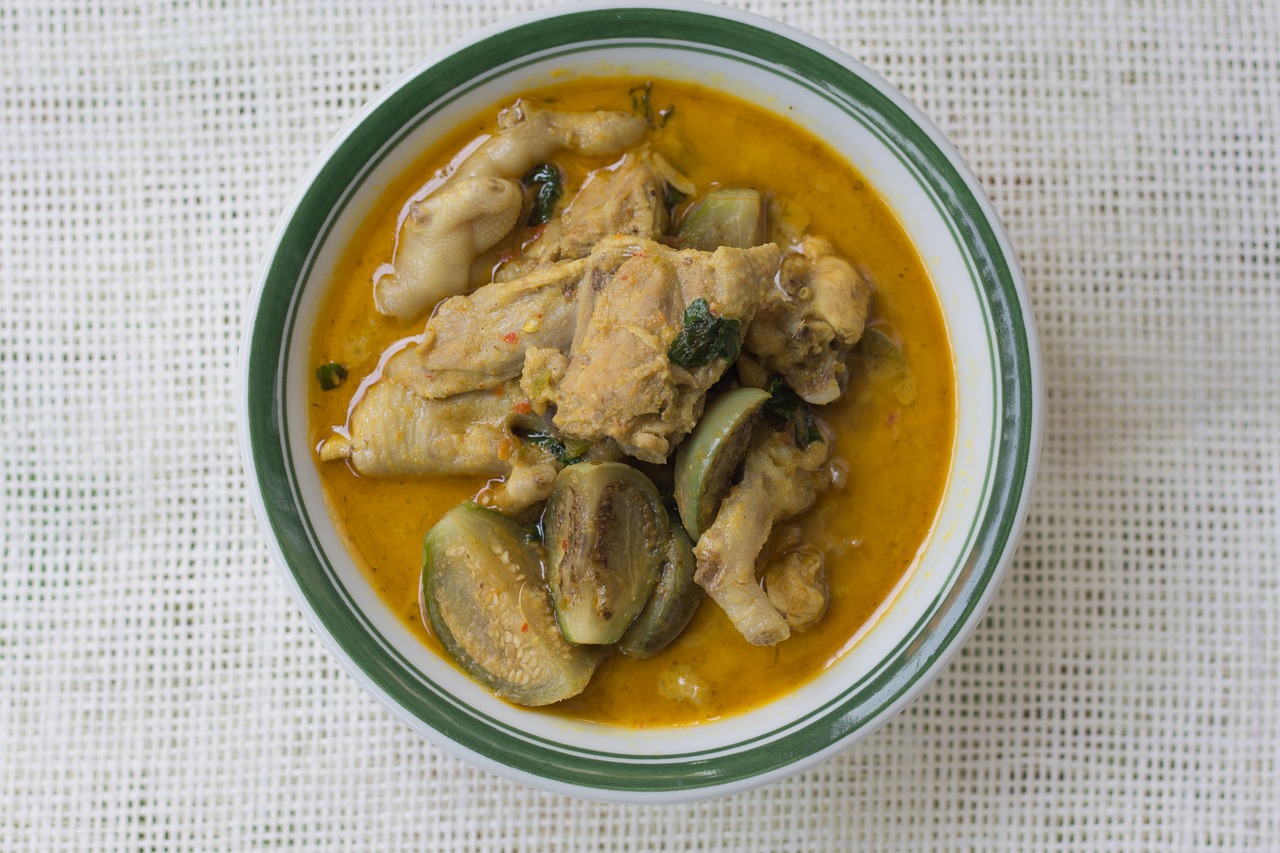Eggplant Thai Curry: A Spicy and Flavorful Dish
If you’re looking for a flavorful and easy-to-make dish, look no further than eggplant Thai curry. This delicious recipe is a staple of Thai cuisine, and it’s easy to see why. The combination of creamy coconut milk, spicy red curry paste, and tender eggplant creates a dish that’s both satisfying and comforting.
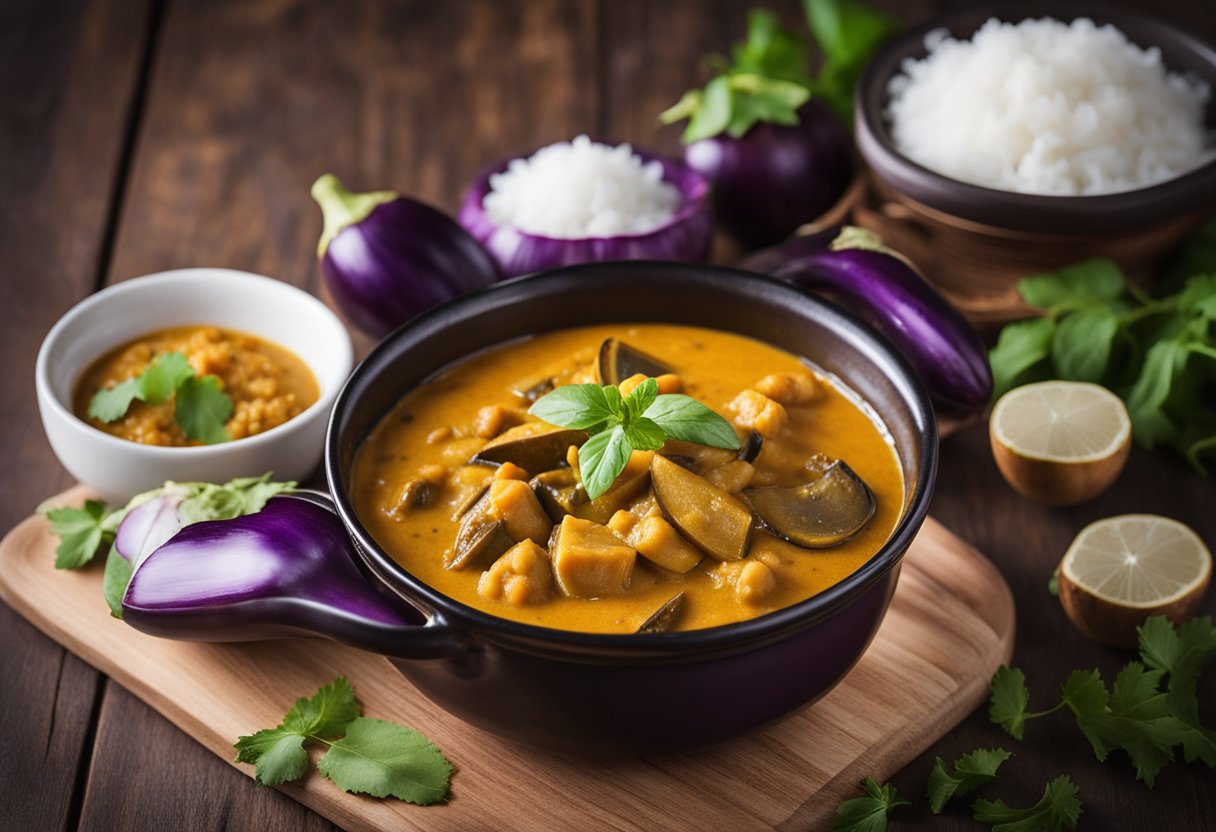
Origins of Eggplant Thai Curry , is a traditional Thai dish that’s been enjoyed for centuries. It’s believed to have originated in central Thailand, where eggplants are a common ingredient in many dishes. Over time, the recipe has evolved to include a variety of different ingredients, from tofu and chickpeas to sweet peppers and onions. Today, eggplant Thai curry is enjoyed all over the world, and it’s a favorite among vegetarians and meat-eaters alike.
Key Takeaways
- Eggplant Thai curry is a traditional Thai dish that’s easy to make and packed with flavor.
- The key ingredients in eggplant Thai curry include creamy coconut milk, spicy red curry paste, and tender eggplant.
- it can be served with rice or noodles, and it’s a great way to incorporate more vegetables into your diet.
Origins
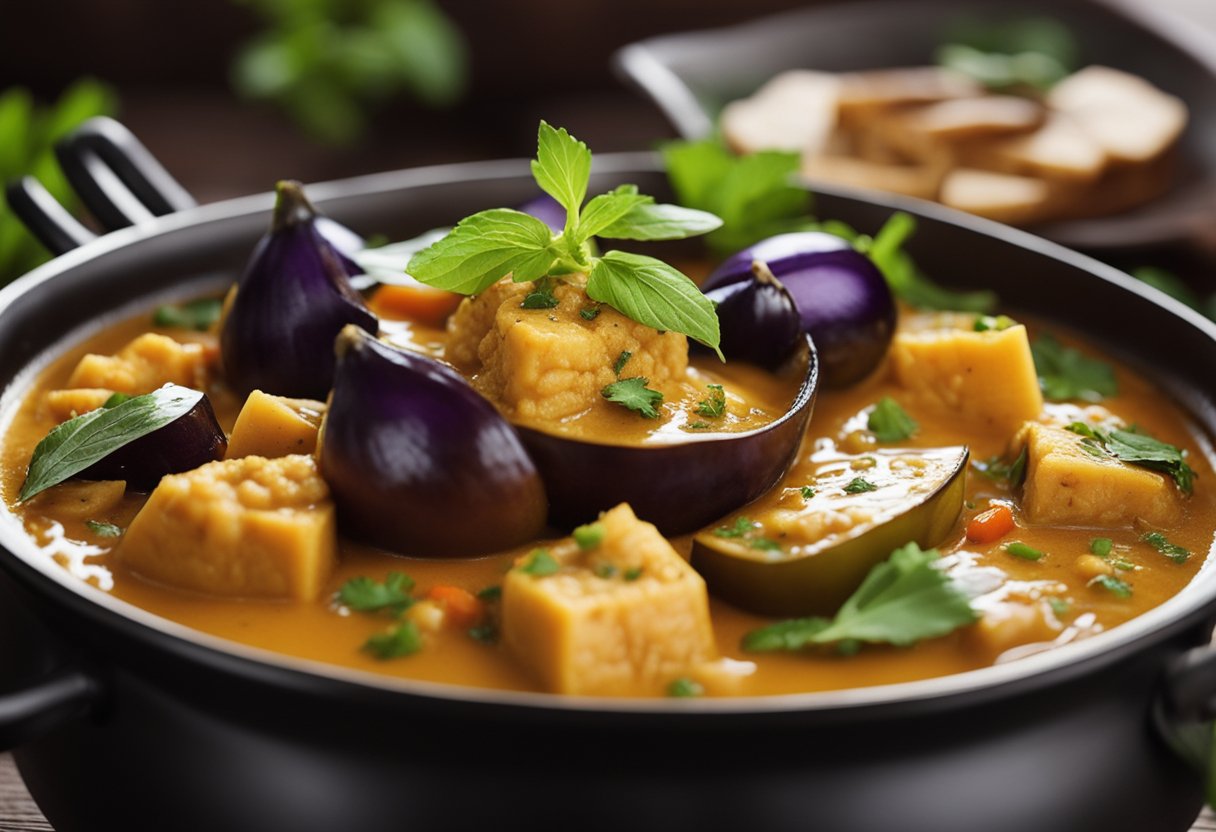
If you’re a fan of Thai cuisine, you’ve probably tried eggplant Thai curry at some point. But do you know where this delicious dish comes from?
Thai curry in general has its roots in Indian cuisine, but over time, it has evolved to become a uniquely Thai dish with its own distinct flavors and ingredients. Eggplant Thai curry is just one of the many variations of Thai curry that you can find in Thailand.
E T C typically features eggplant, peppers, onions, and aromatics like ginger and garlic. The eggplant used in Thai cuisine is different from the eggplant commonly found in Western supermarkets. Thai eggplants are smaller and rounder than their Western counterparts, and they have a slightly bitter taste. They are also firmer and have less moisture, which makes them ideal for use in curries.
While the exact origins of eggplant Thai curry are unclear, it is believed to have originated in central Thailand, where eggplants are a common ingredient in many dishes. Over time, the dish has spread throughout Thailand and beyond, and it is now a popular choice in Thai restaurants all over the world.
In conclusion, it is a delicious and flavorful dish that has its roots in Thai cuisine. With its unique blend of ingredients and spices, it is the perfect choice for anyone looking to explore the flavors of Thailand.
Key Ingredients
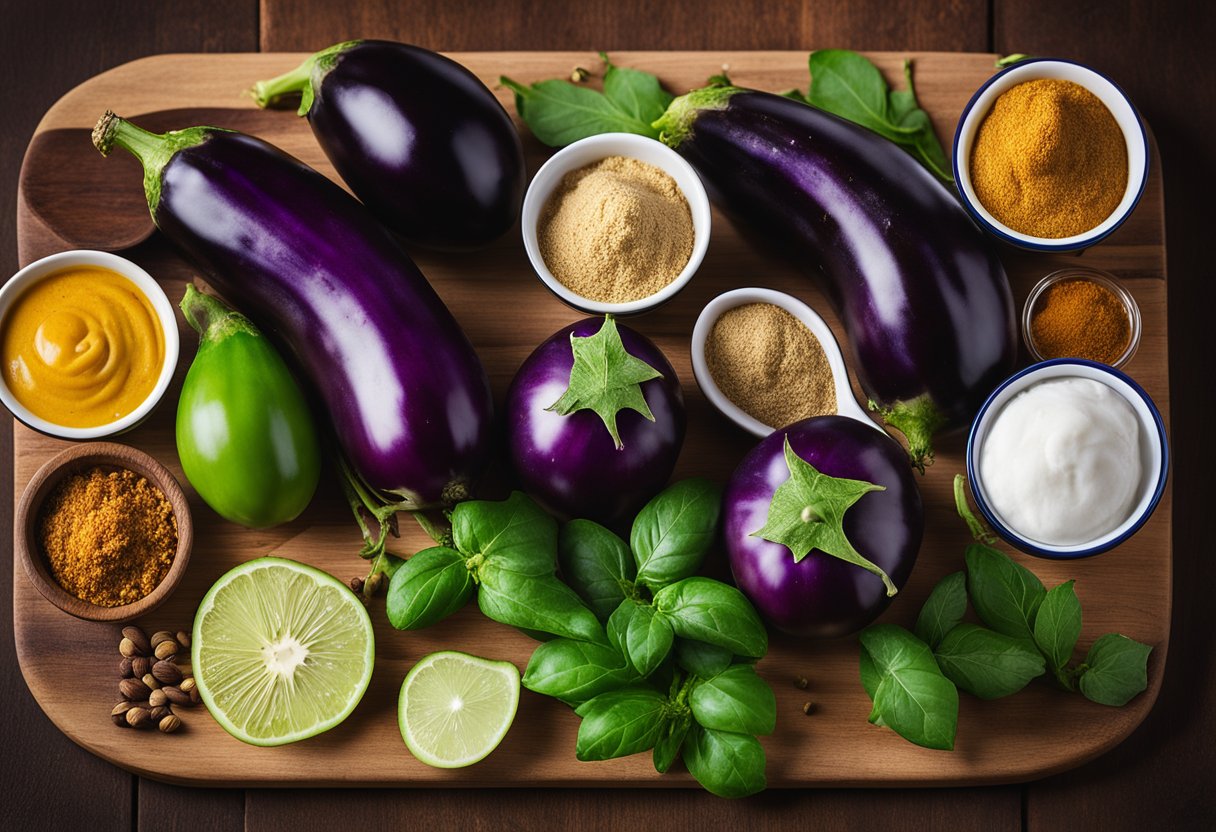
When it comes to making a delicious Thai eggplant curry, there are a few key ingredients that you simply cannot do without. In this section, we’ll explore the most essential components of this popular dish, including eggplant varieties, essential spices, coconut milk, and protein options.
Eggplant Varieties
Eggplant is the star of the show in any Thai eggplant curry, and there are a variety of different types of eggplant that can be used in this dish. Some of the most common varieties include:
- Thai eggplant: Small and round, with a slightly bitter flavor and a firm texture that holds up well in curries.
- Japanese eggplant: Longer and thinner than Thai eggplant, with a sweeter flavor and a softer texture.
- Globe eggplant: Large and oval-shaped, with a mild flavor and a softer texture than Thai or Japanese eggplant.
No matter which variety you choose, be sure to cut the eggplant into larger pieces to retain its texture as it cooks.
Essential Spices
Thai eggplant curry is known for its bold and aromatic spices, which give the dish its signature flavor. Some of the most essential spices include:
- Curry paste: A blend of dried chilies, galangal, turmeric, lemongrass, shrimp paste, and kaffir lime that forms the base of the curry.
- Garlic: Adds a pungent and slightly sweet flavor to the dish.
- Ginger: Adds a warm and slightly spicy flavor to the dish.
- Lemongrass: Adds a bright and citrusy flavor to the dish.
- Kaffir lime leaves: Adds a fragrant and slightly bitter flavor to the dish.
Coconut Milk
Coconut milk is another essential ingredient in Thai eggplant curry, providing a rich and creamy base for the dish. Look for canned coconut milk that is full-fat and unsweetened for the best results.
Protein Options
While eggplant is the main ingredient in Thai eggplant curry, it’s often paired with a protein source to make the dish more filling. Some popular options include:
- Chicken: Cut into bite-sized pieces and cooked until tender.
- Shrimp: Added to the curry during the last few minutes of cooking to prevent overcooking.
- Tofu: Pressed and cut into bite-sized pieces, then added to the curry during the last few minutes of cooking.
By using these key ingredients in your Thai eggplant curry, you can create a flavorful and aromatic dish that’s sure to impress.
Cooking Techniques
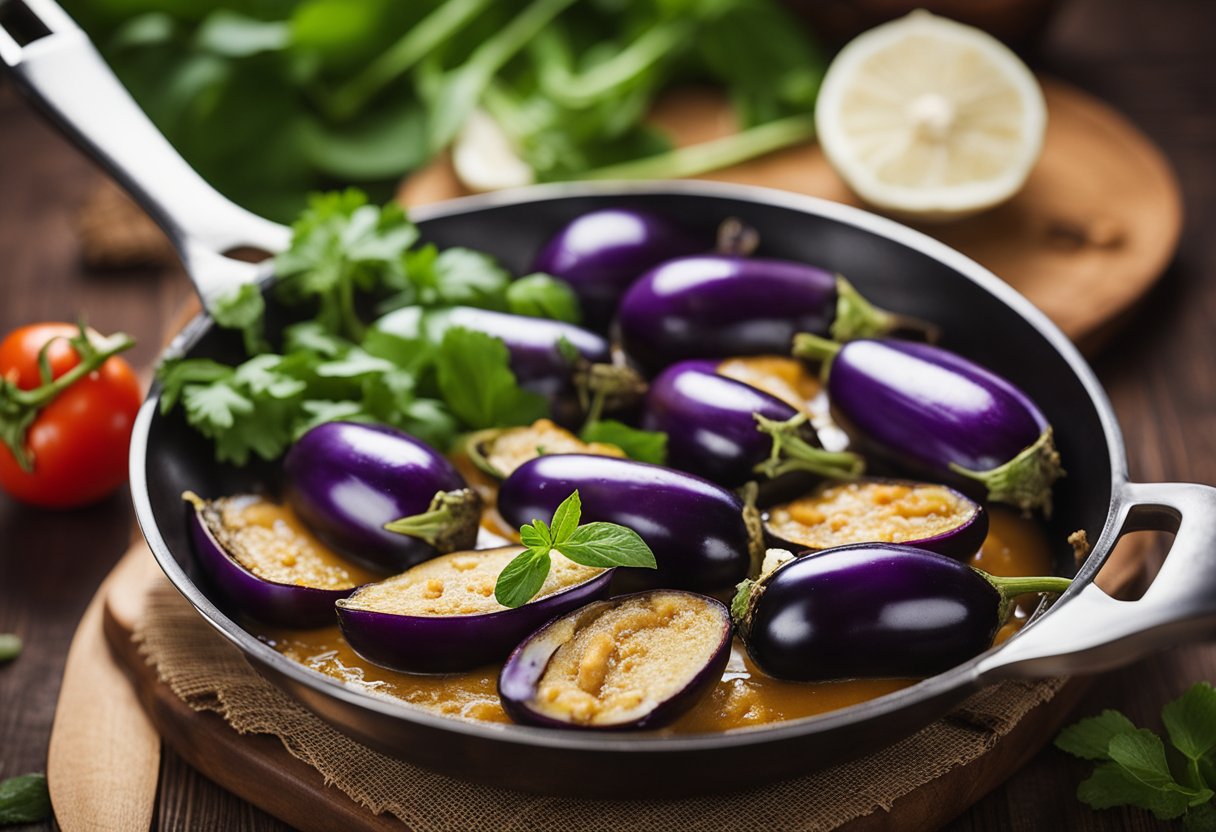
Preparation of Eggplant
Eggplant is a key ingredient in Thai curry. It is important to choose the right kind of eggplant for the dish. Thai eggplants are small and round, and they have a slightly bitter taste. They are perfect for curries because they absorb the flavors of the sauce well. You can also use Japanese eggplants or Italian eggplants if Thai eggplants are not available.
Before cooking, it is important to prepare the eggplant correctly. Cut off the stem and slice the eggplant into small pieces. To prevent the eggplant from turning brown, soak it in salted water for 10-15 minutes before cooking. This will also help to remove any bitterness.
Curry Paste Use
Curry paste is the base of the Thai curry. It is important to use a good quality curry paste to get the best flavor. You can make your own curry paste or buy it from the store. If you are using store-bought curry paste, make sure to check the ingredients list to ensure that it does not contain any artificial preservatives or additives.
To get the most flavor out of the curry paste, it is important to fry it in oil before adding the other ingredients. This will help to release the flavors and aromas of the spices. Fry the curry paste until it becomes fragrant and the oil separates from the paste.
Simmering Process
The key to a good Thai curry is the simmering process. Once you have added all the ingredients to the curry, bring it to a boil and then reduce the heat to a simmer. Simmer the curry for at least 20-30 minutes to allow the flavors to develop.
Stir the curry occasionally to prevent it from sticking to the bottom of the pan. If the curry is too thick, you can add more coconut milk or water to thin it out. If the curry is too thin, you can simmer it for a few more minutes to reduce the liquid.
In summary, choosing the right eggplant, using good quality curry paste, and simmering the curry properly are all important factors in making a delicious Thai eggplant curry.
Serving Suggestions
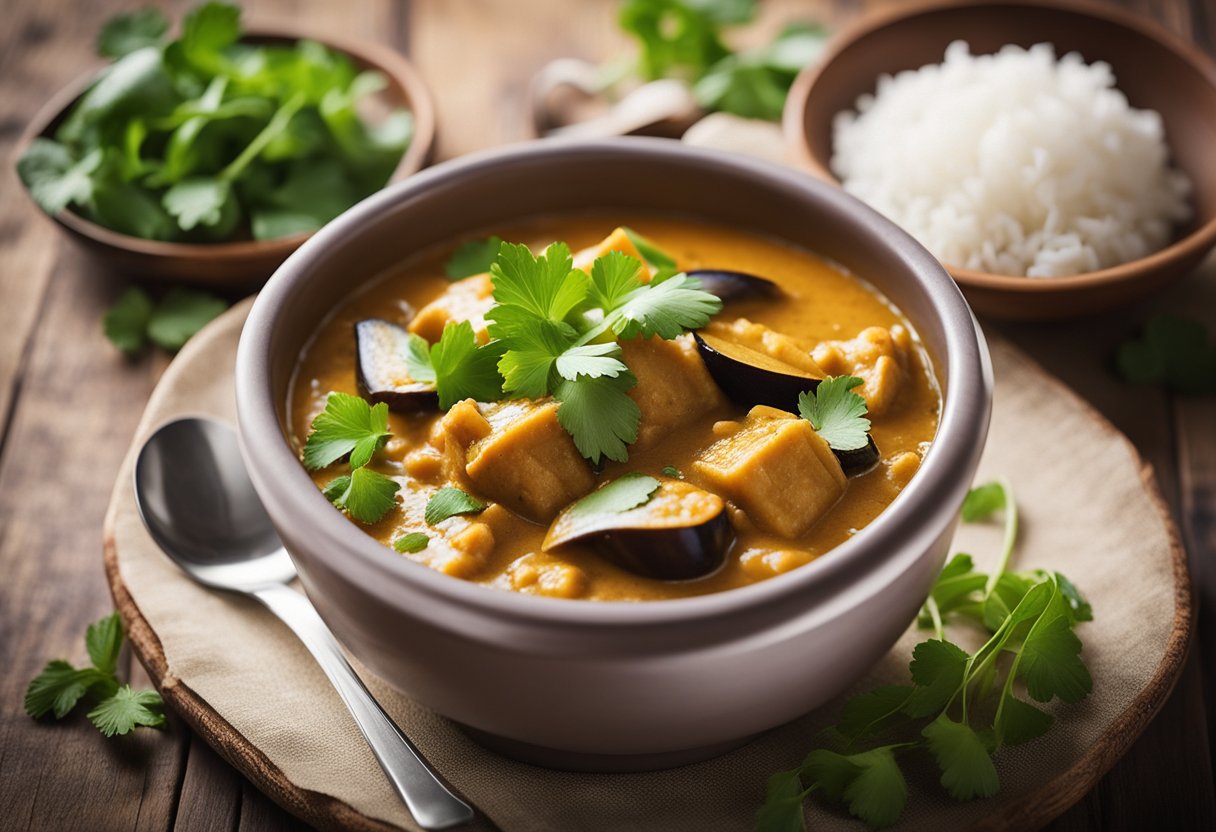
Accompaniments
Thai Eggplant Curry is a versatile dish that can be served with a variety of accompaniments. The most common accompaniment is steamed white rice, which can be jasmine or basmati rice. The rice helps to balance the spiciness of the curry and soak up the flavorful sauce. You can also serve the curry with noodles, such as rice noodles or egg noodles, for a heartier meal.
If you want to add some freshness to your meal, you can serve the curry with a side of cucumber salad or sliced cucumbers. The coolness of the cucumbers provides a nice contrast to the warm and spicy curry. Another great accompaniment is stir-fried vegetables, such as bok choy, broccoli, or snow peas. These vegetables are a great way to get some extra nutrition and texture in your meal.
Garnishes
Garnishes are a great way to add some color and texture to your Thai Eggplant Curry. The most common garnish is fresh cilantro, which adds a bright and herbaceous flavor to the dish. You can also add some sliced red chili peppers for some extra heat and color. Another great garnish is roasted peanuts, which provide a nice crunch and nuttiness to the dish.
If you want to add some creaminess to your curry, you can top it with a dollop of coconut cream or coconut yogurt. This will help to balance the spiciness of the curry and add some richness to the dish. Finally, you can add a squeeze of lime juice to your curry to brighten up the flavors and add some acidity.
In conclusion, Thai Eggplant Curry is a delicious and flavorful dish that can be customized to your liking. By serving it with different accompaniments and garnishes, you can create a meal that is perfect for your taste buds.
Nutritional Information
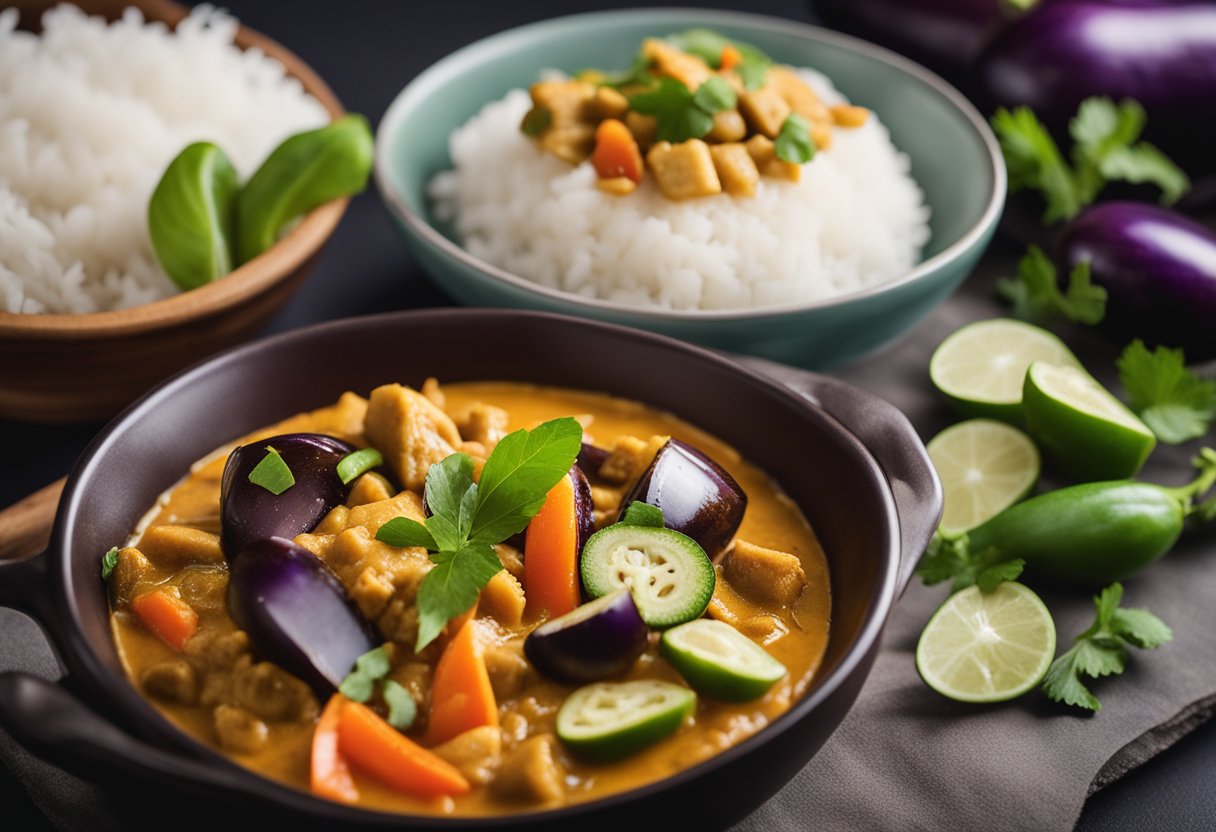
If you’re looking for a flavorful and healthy dish, Thai eggplant curry is a great option. Here is some nutritional information about this delicious dish:
Calories
Thai eggplant curry is a low-calorie dish, making it a perfect option for those watching their calorie intake. One serving of Thai eggplant curry contains approximately 143 calories 1.
Protein
Eggplant is a good source of protein, and Thai eggplant curry is an excellent way to incorporate this nutrient into your diet. One serving of Thai eggplant curry contains approximately 2.5 grams of protein 2.
Vitamins and Minerals
Thai eggplant curry is rich in vitamins and minerals, including vitamin C, vitamin K, and potassium. These nutrients are essential for maintaining a healthy immune system, strong bones, and healthy blood pressure 3.
Fat and Carbohydrates
Thai eggplant curry is a low-fat and low-carbohydrate dish, making it an excellent option for those looking to maintain a healthy diet. One serving of Thai eggplant curry contains approximately 7 grams of carbohydrates and 10 grams of fat 4.
In summary, Thai eggplant curry is a delicious and healthy dish that is low in calories and fat while being rich in protein, vitamins, and minerals. It’s a great option for those looking to maintain a healthy diet while enjoying a flavorful meal.
Footnotes
- Source: My Life Cookbook ↩
- Source: My Life Cookbook ↩
- Source: The Yummy Bowl ↩
- Source: My Life Cookbook ↩
Variations
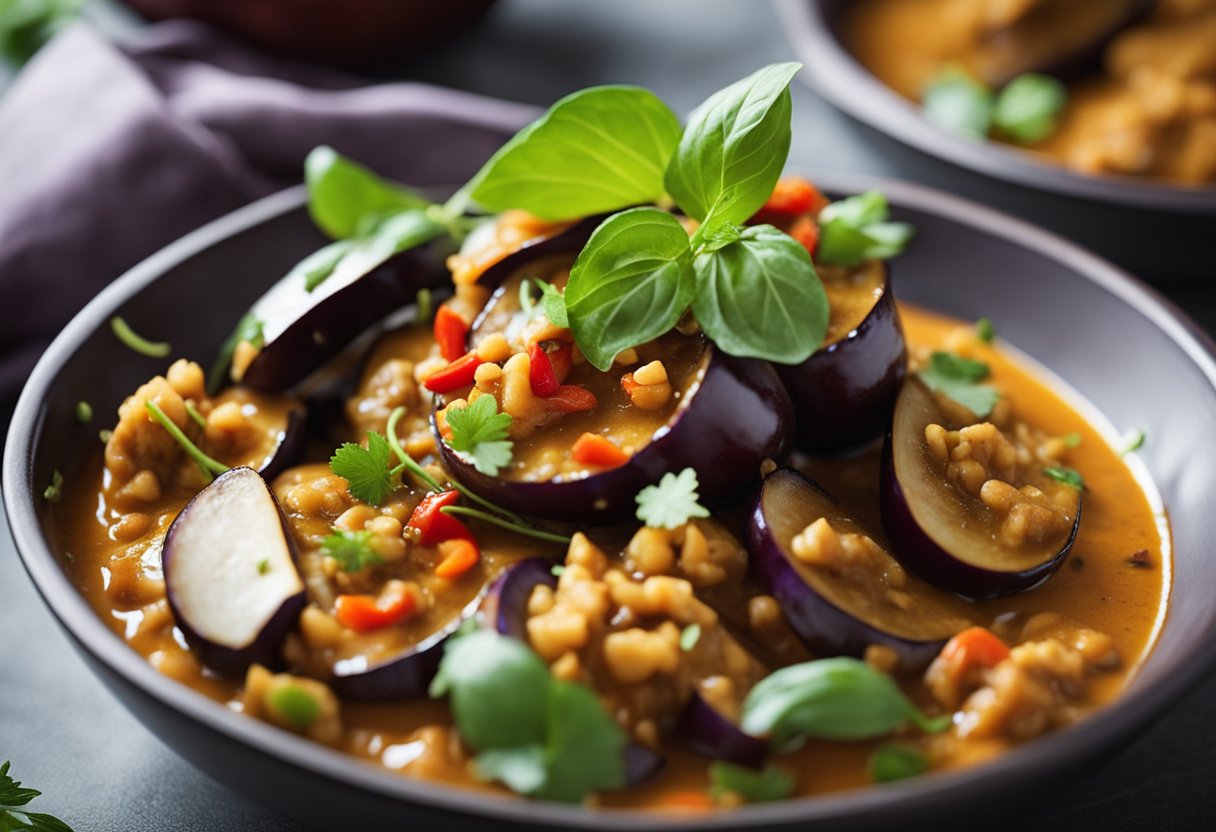
Thai Eggplant Curry is a versatile dish that can be customized to your liking. Here are some variations of Eggplant Thai Curry that you can try:
Regional Twists
Different regions in Thailand have their take on Eggplant Thai Curry. For example, in the north of Thailand, they use a lot of herbs like lemongrass, galangal, and kaffir lime leaves. In the south, they use more turmeric, coconut cream, and fish sauce. You can experiment with different regional twists to find your favorite.
Vegetarian and Vegan Versions
If you’re a vegetarian or vegan, you can still enjoy the deliciousness of Eggplant Thai Curry. Instead of using meat, you can use tofu, tempeh, or seitan. You can also add more vegetables like bell peppers, broccoli, or snow peas to make it more nutritious.
Here’s a table that shows some ingredients you can use to make vegetarian and vegan versions of Eggplant Thai Curry:
| Protein | Vegetables | Curry Paste |
|---|---|---|
| Tofu | Bell peppers, Broccoli, Snow peas | Red or Green Curry Paste |
| Tempeh | Carrots, Cauliflower, Zucchini | Massaman Curry Paste |
| Seitan | Mushrooms, Spinach, Bok Choy | Panang Curry Paste |
In conclusion, Eggplant Thai Curry is a delicious and versatile dish that you can customize to your liking. Whether you prefer a regional twist or a vegetarian/vegan version, there are plenty of options to choose from.
Storage and Reheating Tips
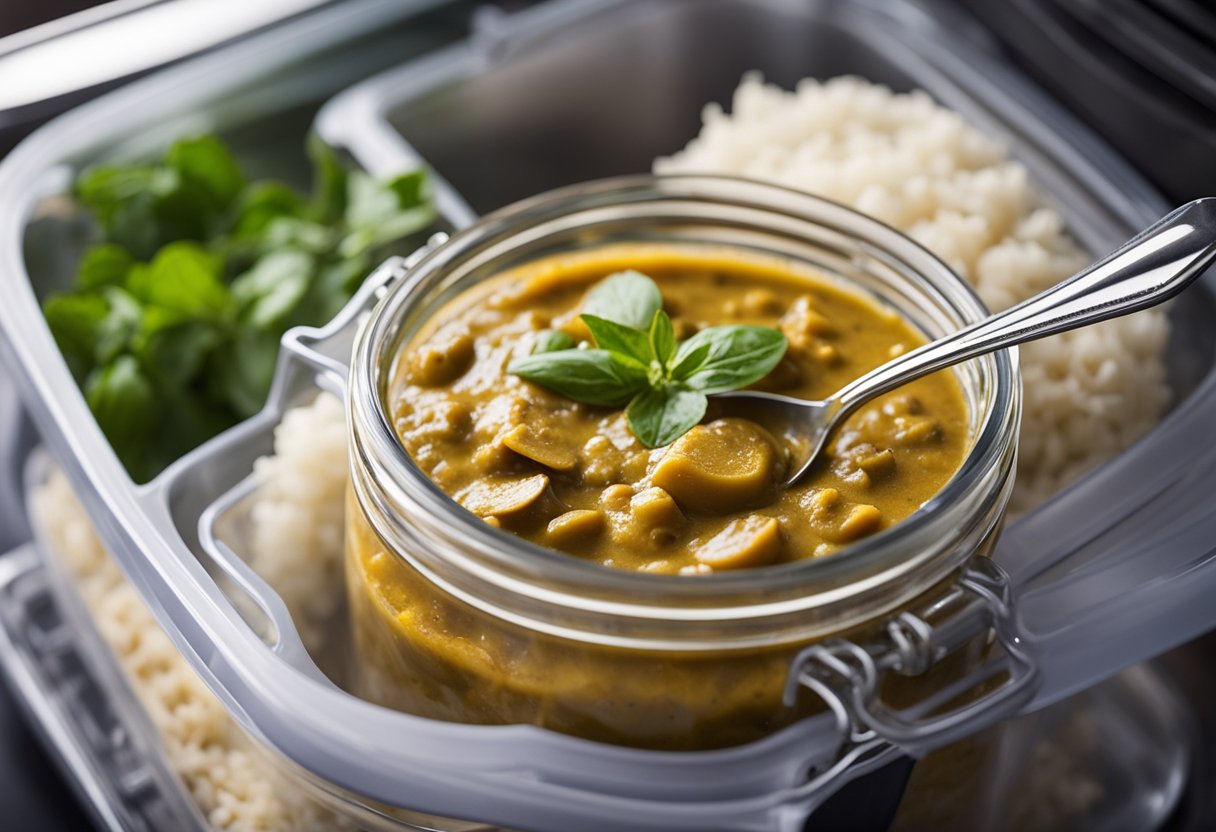
Once you have made your delicious Thai eggplant curry, you might be wondering how to store and reheat it properly so that it retains its flavor and texture. Here are some simple tips to help you with that:
Storing
- Store your leftover curry in an airtight container in the refrigerator for up to 4 days.
- If you have a large batch of curry, divide it into smaller portions before storing. This will make it easier to reheat only what you need.
- Label the container with the date so that you can keep track of how long it has been in the fridge.
Reheating
- You can reheat your curry on the stovetop or in the microwave.
- If reheating on the stovetop, add a splash of water or coconut milk to the curry to prevent it from drying out.
- If reheating in the microwave, cover the container with a microwave-safe lid or plastic wrap to prevent splatters.
- Heat the curry in 30-second intervals, stirring in between, until it is heated through.
- Avoid reheating the curry more than once, as this can affect the flavor and texture.
By following these simple tips, you can enjoy your delicious Thai eggplant curry for days to come.
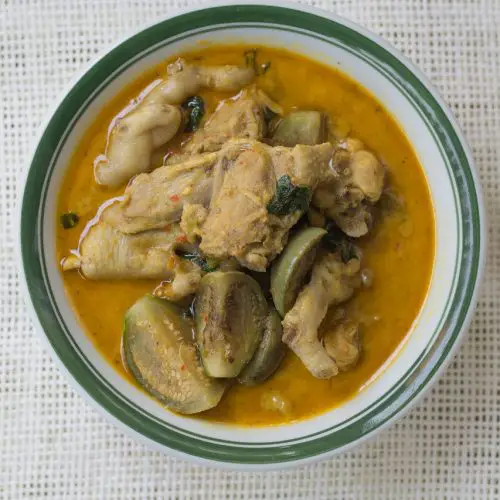
Eggplant Thai Curry
Ingredients
- 1 box (8 ounces) manicotti shells
- 1 jar (24 ounces) marinara sauce
- 2 cups ricotta cheese
- 1 cup shredded mozzarella cheese
- 1/2 cup grated Parmesan cheese
- 1 egg
- 2 cloves garlic, minced
- 1 tablespoon dried basil
- 1 tablespoon dried parsley
- Salt and pepper to taste
- Fresh basil leaves for garnish (optional)
Instructions
- Heat the vegetable oil in a large skillet or wok over medium heat. Add the onion, bell pepper, garlic, and ginger. Cook for 2-3 minutes until the vegetables are softened.
- Add the Thai red curry paste to the skillet and stir well to combine with the vegetables.
- Pour in the coconut milk and stir until the curry paste is fully dissolved into the coconut milk.
- Add the cubed eggplant to the skillet and stir to coat with the curry sauce. Allow the mixture to simmer for about 10-15 minutes, or until the eggplant is tender.
- Stir in the soy sauce, brown sugar, and lime juice. Season with salt and pepper to taste.
- Once the eggplant is cooked through and the sauce has thickened slightly, remove the skillet from the heat.
- Serve the Eggplant Thai Curry hot over cooked rice, garnished with fresh cilantro.

